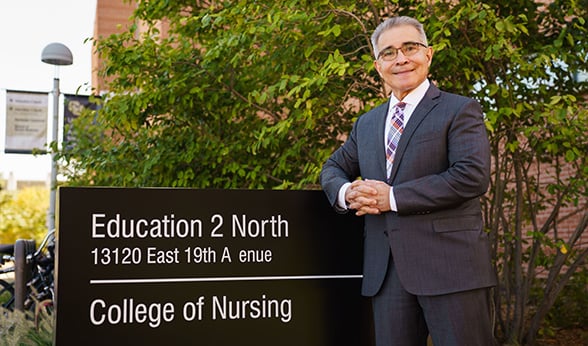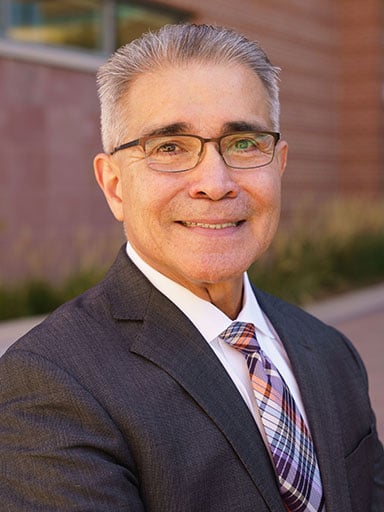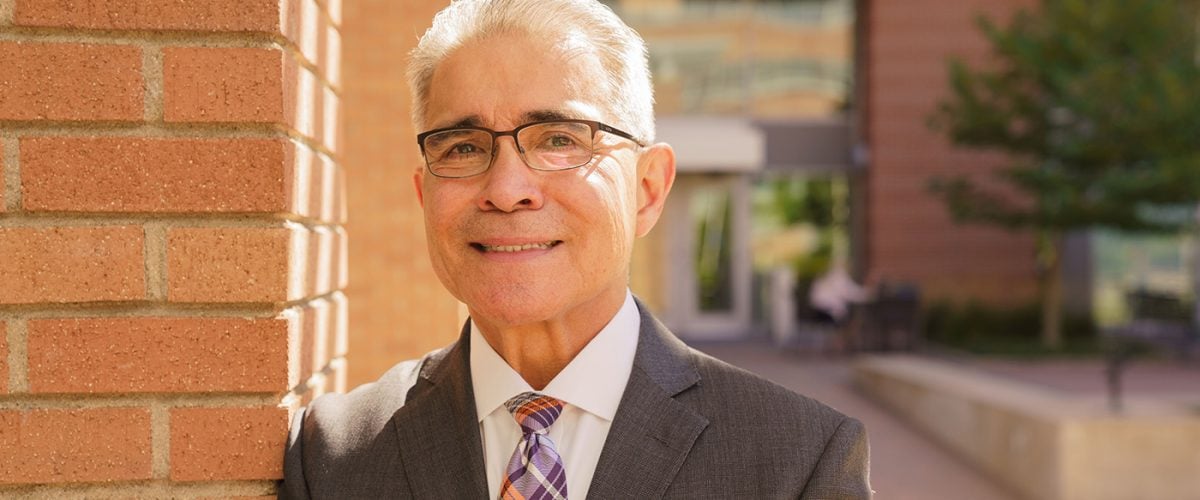Growing up in a large family, especially as the middle child, tends to enhance a person’s powers of observation.
So it was for Elias Provencio-Vasquez, PhD, RN, FAAN, FAANP, new dean of the CU College of Nursing, who grew up as the only boy in a family of seven children. His parents were Mexican immigrants living in Phoenix. Their life was geared toward day-to-day survival, tending to daily chores and family functions, so notions about higher education didn’t enter the picture. Still, Provencio-Vasquez knew there was a better way, and he became the only member of his family to go to college (several of his nieces and nephews have since graduated from college).
Stepping out of his comfort zone and becoming “the first” would emerge as a theme in Provencio-Vasquez’s life. He became the first Latino male to earn a doctorate in nursing and head a nursing school in the United States.
Prior to his current position, Provencio-Vasquez served as dean of the nursing school at the University of Texas El Paso, associate dean at the University of Miami and director of the Neonatal Nurse Practitioner program at the University of Texas at Houston and the University of Maryland.
During his career, he has served as a clinical nurse, a nurse researcher, a nurse educator, school administrator, and a pediatric and neonatal nurse practitioner. He is internationally renowned for his pioneering work in neonatal and pediatric care and in women’s health. Provencio-Vasquez is also a Robert Wood Johnson Executive Nurse Fellow alumnus, a Robert H. Hoy III Distinguished Professor in Health Sciences and serves on several community and editorial boards.
As he looks ahead, Provencio-Vasquez sees incredible opportunities in the College of Nursing — building on the college’s many successes and creating bridges to new opportunities in the future. “With my career, I’ve saved the best for last,” he says with a warm and ever-present smile. “This is where I plan to stay and finish my career.”
What made you want to pursue nursing and academia?

Early exposure to hospitals and nurses inspired Provencio-Vasquez to pursue a career in nursing.
Initially I thought I wanted to be psychologist. In college, I worked as a unit clerk in an emergency room in Phoenix, and I saw what the nurses did and how they took care of patients. I found that nursing and health care were what I wanted to focus on. Before that, in high school, I worked as a dishwasher in a hospital kitchen. That was my first exposure to nurses, and it definitely piqued my interest. But it was especially the nurses I worked with during college, in the hospital ER unit, who were very supportive and encouraging.
You are a first-generation college graduate of Mexican immigrants, and you come from a large family. How did your childhood influence where you are today?
I was the only boy, the middle child, and I had six sisters. My dad had a very strong work ethic; he was a bricklayer in Phoenix. As you know, it gets very hot there in the summer. He’d take me to work with him and I remember being so miserable, laying bricks in the heat. I realized at a young age that my ticket for getting out of manual labor was to go to college. With my dad working hard to support a family of seven kids, college and education were not part of the agenda of our lives. But I knew I needed to get educated and work toward a profession.
Growing up with sisters had a real impact on me. It translated into the strong respect I have for women and how I enjoy working with them to this day. I think it also positioned me to be a very caring nurse.
What drew you to academia?
I was a nurse for 15 years – first an ER nurse and then a neonatal nurse working with babies. I received my PhD from the University of Arizona in 1992 and I was recruited by the University of Texas Medical Center in Houston to direct its neonatal nurse practitioner program. I spent 10 years as a program director, learning how to navigate academia and how to be a faculty member as opposed to a clinician; they are two very different things. While there, I satisfied my love of patient care by running a clinic for drug- and HIV-exposed infants.
During that time, I got exposed to teaching nursing students, and I really enjoyed it. My specialty was maternal health, and I mostly taught undergraduate students in pediatrics and OB/GYN. I discovered that I really enjoyed academia, so I stuck with it.
What got you interested in reducing maternal risk of substance abuse, HIV exposure and intimate partner violence during and after pregnancy?
In Houston in the early ’90s I worked in a clinic specifically for HIV- and drug- and alcohol-exposed infants. It was during the crack cocaine era, and a lot of babies born were exposed to cocaine and alcohol. I got to know the mothers by taking care of these infants and children. It was an ‘a-ha’ moment. I realized I should focus on taking care of the mothers because they are the gatekeepers of their children’s health. I wanted to give them the skills and tools needed to be good mothers.
Your doctoral dissertation tracked premature babies and their families after they were discharged from the hospital. Did your clinical work in Houston help you decide how to focus your research?

Elias Provencio-Vasquez, PhD, RN, FAAN, started as dean of the College of Nursing in early September.
Back then, welfare services would take kids from mothers who tested positive for cocaine. I would go to the mothers’ homes and give them skills to help them get their children back. So my research focus went toward women and particularly those at risk for health issues and violence. My research helped create an intervention for nurses to help parents of premature infants transition from hospital to their homes. I wanted to help them realize how powerful they were as women and mothers and assist in giving them the tools to be great mothers.
To what do you attribute your success?
Fortunately, I had people along the way who encouraged and mentored me. My mentors were women who really supported and encouraged me to go for that next degree, that next position. They encouraged me to stretch and challenge myself. I believe there is no such thing as luck; it’s what you do with an opportunity that is given to you. I have had many doors opened to me, and I really attribute that to my success and where I am today.
I am at the point in my career where I want to pay it forward and help mentor the next generation of nurses and nurse scientists, because it really had an impact on me.
What does it mean to you to be the first Latino male to earn a doctorate in nursing and head a nursing school in the U.S.?
In terms of being a male in nursing, it is still a very small percentage. There are 3.1 million nurses in the United States and only 9 percent are male. Being a male in nursing in the ’70s and ’80s was a challenge and an opportunity. I look back now and I see that the University of Arizona was proud of the fact that I was the first Latino male to earn a PhD in nursing. I was proud, too, but now I look back and think, ‘Well, it was about time.’ It should have happened well before I came along. Being first is a good feeling because it opened the doors for others to follow.
What excites you about CU and the College of Nursing?
The CU College of Nursing has an amazing history and has made some incredible contributions to health care and nursing. This is where the nurse practitioner field was invented, which has made major contributions to health care in the U.S. Another amazing thing is the many clinics we have in the community providing health care to underserved communities. Our 120-year history is very rich and something to build upon. And the faculty and staff who support this college are really impressive.
'Our faculty want to continue to see the college succeed and make history. They have made a commitment not only to nursing and research, but to the community as well.’ — Nursing Dean Provencio-Vasquez
The commitment and longevity of the faculty here speaks for itself. They want to continue to see the college succeed and make history. We have faculty who have made a commitment not only to nursing and research, but to the community as well. I am very impressed with our clinics that serve parts of our community that have challenges in health care.
I am excited about our past, but want to make our own history. In 10 years we’re going to say, ‘Look what we did as a College of Nursing.’
Do you view the College of Nursing’s location at the CU Anschutz Medical Campus as a plus?
When your college is part of a larger medical campus it affords many different types of opportunities in terms of clinical practice, research and collaborating with other colleges. There are a lot of opportunities to build bridges with other schools and colleges as well as the hospitals on campus.
You have undoubtedly noticed a campus-wide emphasis on fostering a diverse and inclusive culture. How will you promote diversity within the College of Nursing?
I am impressed by the effort and strategies CU has implemented and focused on to promote diversity within the student population as well as the faculty and staff. There are deliberate reasons to do this, to look like the community we serve. I have talked to faculty members who want to start the conversation and see what we can do to increase diversity among students, faculty and staff. We also need to implement strategies and initiatives that create the desired outcome — that by increasing diversity, we make it more likely for everyone to be successful within the institution.
I think we have a lot of work ahead of us. But I already feel the commitment from the faculty and staff to make that happen, which is refreshing to me.
This interview is taking place early — just your second day on the job. What are your final thoughts about all that is yet to come?
The potential this college has to move forward and to the next level — whatever we decide that to be — is exciting to me. There are untapped possibilities we will all discover. It’s all about building bridges.
In the News: Telemundo, Oct. 3, 2018: Hispano hace su sueño realidad
Editor's note: Video at top courtesy of the College of Nursing.

.png)

